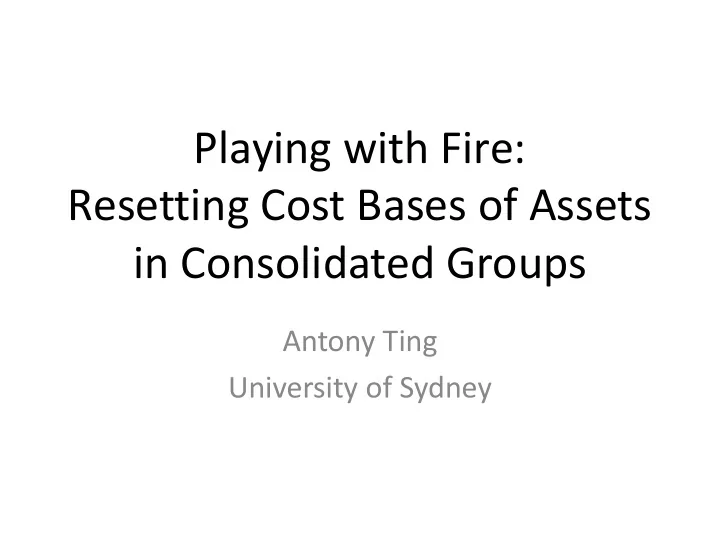

Playing with Fire: Resetting Cost Bases of Assets in Consolidated Groups Antony Ting University of Sydney
The Story • Australia’s consolidation regime: – Introduced in 2002 – the first “asset-based model” – Regular fine-tunings ever since • “Fine-tuning” in June 2010: – Unintended and unforeseen revenue impact of A$10 billion • Aims of the research: – What has happened? What has Why did it – Why did it happen? The Lessons – Lessons to learn? happened? happen?
What has The 2010 Amendments happened? In less than ten months after the 2010 amendments became effective, 2010: amendments in corporate groups respect of rights to future lined up to claim income (RTFI) and residual tax refunds tax cost setting (TCS) rules: amounted to A$10 2005: Original • RTFI: new generous billion intention of the specific deduction only government: for consolidated groups • WIP: equal with far wider scope than treatment WIP (e.g. mobile phone between contracts) 2004: ATO draft consolidated • Residual TCS provision: tax and confirm treatment of determination: unconsolidated reset cost bases of assets • No deduction groups not explicitly stipulated for WIP of in the tax law (e.g. joining consumables and subsidiary revenue assets)
What has The Government’s Responses happened? July 2012: • Retrospective amendments to November retrospective legislation 2011: Government • complex matrix with 3 announced its sets of rules applying intention to to 3 periods May 2011: amend Board of • Removed the 2010 retrospectively Review specific deduction the 2010 produced a provision for RTFI amendments report • Instead, amended existing deduction March 2011: provisions to cater for Government reset WIP amounts of asked Board of consolidated groups Taxation to • Limit scope of assets urgently review eligible for TCS the 2010 amendments
What has The Unforeseen Revenue Impact The Unforeseen Revenue Impact happened? • Original Bill: – The 2010 amendments would have “a small but unquantifiable cost to revenue” • Promptly after the introduction of the Bill to the parliament: – Changed the estimated revenue impact to: “a significant but unquantifiable cost to revenue”
Why did it The unique consolidation model happen?
Why did it The RTFI Issue happen? • Single entity rule – A fiction detached from the reality – Creates uncertainties and controversies – ATO still struggling to understand fully its implications • Difficult interactions with other parts of the income tax system – ATO draft determination: reset cost bases of WIP not “incurred” or “paid” by the head company • Against the purpose of the consolidation regime
The The “minor” Issue: RTFI Lessons • Tax policy principle 101: preferential provisions should be carefully drafted to ring fence its scope • Simplicity: revise existing provisions instead of creating new ones to minimise risk of unintended/unforseen interactions with the notoriously complex consolidation regime
The Playing with Fire: the Structural Issue Lessons • Meaning of “asset” for TCS purposes – Original meaning: economic concept – “ anything of economic value ” – 2010 amendments: further encouraged taxpayers to separately recognise goodwill-like assets such as: – Expected future profits from insurance contracts; – Customer relationship, customer lists; – Know how, trade secrets – 2012 amendments: – Under prospective rules, scope of TCS rules is limited to assets recognised by other parts of the tax law – However, not the most significant item in the Table…
The Playing with Fire: the Structural Issue Lessons • Resetting cost bases • Treatment of “revenue assets”: untouched – Tax arbitrage opportunities among different classes of assets – Structural issue: a deemed cost of a deemed acquisition of an asset based on the market value of the asset at the joining time – Ignore legal facts to create “economically equivalent” fictions – Expose to manipulations fuelled by: • Ingenuity of taxpayers and tax advisers • Market valuation: an art more than a science • Time lag between share acquisition and joining time: e.g. the acquisition of St. George Bank by Westpac Bank
Recommend
More recommend